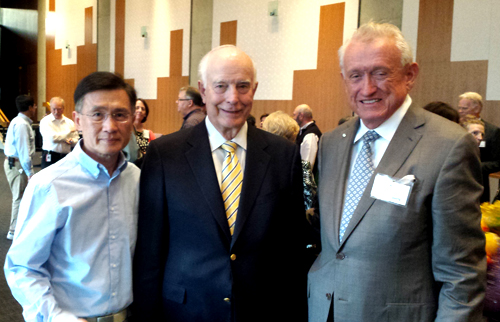By Tung Vu
For Northwest Asian Weekly

From left: Tung Vu with former governor Daniel Evans and former secretary of Washington state Ralph Munro
It is important for members of our Vietnamese community to honor those who served and sacrificed in Vietnam. We wish to remember them for defending the republic and the cause of freedom and finally for all Vietnamese Americans to remember the struggles to reestablish our lives in America and adjust to this new land.
From 1954-1955, nearly a million Vietnamese supported by American and French Navies, moved to the south thereby escaping rule by the Communists. The French were ultimately defeated and America entered Vietnam with hopes of halting the spread of communism. The conflict went on for another 20 years.

In 1973, the Paris Accord was approved by President Nixon calling for an immediate cease-fire and a complete withdrawal of American troops. In the Fall of 1974 American Congress cut funding to South Vietnam for the upcoming fiscal year from a proposed 1.26 billion to 700 million dollars. Conversely, the Soviets and Chinese increasingly lent moral, logistic and military support to North Vietnam causing a shift in the balance of power. The North Vietnamese force was no longer a guerilla army. For the first time in the war, the North Vietnamese had significant fire power and mobility advantages over the South Vietnamese. Without the necessary funds and support of the allies the South Vietnamese army found it logistically and financially impossible to counter the North Vietnamese Army.
President Ford, not wanting to abandon his allies and desiring to maintain the country’s honor chose to support the southerners militarily. But Congress, reflecting exhaustion with the Vietnamese issue, voted down Ford’s emergency request. Hearing the news, the usually mild-mannered President cursed, “The sons of bitches!” The fall of Saigon was just days away.
During the spring of 1975, 135,000 left South Vietnam, first arriving in the Philippines and Guam reception camps, and then transferring to temporary housing at Army bases in the U.S. After being prepared for resettlement, they were assigned to one of nine voluntary agencies (VOLAGs) that helped find financial and personal support from sponsors throughout the country.
After the fall of Saigon, many Vietnamese chose to leave by any means possible, often in small boats. Those who managed to escape pirates, typhoons, and starvation sought safety and a new life in refugee camps located in Malaysia, Thailand, Singapore, Indonesia, the Philippines, and Hong Kong. For many, these countries became permanent homes, while for others they were only waystations to acquiring political asylum in other nations, including the United States.
The stories, following the communist takeover, are often horrific, tragic, awe-inspiring and reflective of the Vietnamese will to survive. Many died trying to escape. Some were fortunate to get to America and that is where our story begins again.
In 1975, then Senator Joe Biden complained about the Ford administration’s move to bring Vietnamese refugees to the U.S. Presidential candidate George McGovern told Newsweek, “I think the Vietnamese are better off in Vietnam.”
The new governor of California, Jerry Brown, complained that the federal government wants to dump Vietnamese refugees in his state. However, Washington State Governor Dan Evans, furious at Gov. Browns remarks, whole-heartedly welcomed the Vietnamese by way of Camp Murray, where Vietnamese were paired with sponsor families and churches. He instructed Mr. Ralph Munro, secretary of Washington State, to open doors accepting the first 500 Vietnamese and to remind Gov. Brown the words written on the base of the Statue of Liberty.
That’s the brief history of our plight, our journey and our arrival in America.
My father happened to be the founder and editor of “Dat Moi” translated as “New Land” with technical assistance from Mr. Tsuguo Ikeda. This bi-monthly newspaper helped educate and provide valuable information and grounding for the Vietnamese. One of my father’s editorial pieces requesting an extension of the Resettlement program was ordered to be printed in the Congressional Record by Senator Ted Kennedy.
Many challenges and obstacles were encountered by the resettlement program including funding issues and protests outside camp Murray by a White extremist group. Yet overall the resettlement program has been a huge success, as measured by Vietnamese contributions to the economic vitality and cultural diversity of the State of Washington.
Vietnamese values of family, education, prosperity and social justice have shaped the character of our communities.
These values have helped us achieve success in all aspects of society while promoting community issues of equity and opportunity.
The younger generation should not be content with current success but remember that struggles remain and involvement is vital. Nothing comes easy except perhaps complacency. I have learned many lessons working with members of both the left and right to promote issues advancing Asian Americans. Community warriors like Frank Irigon and Al Sugiyama, who were some of the first volunteers to help the Vietnamese refugees at Camp Murray, have time and time again given selflessly for the benefit of so many. (end)
The event was organized by Vietnamese Mutual Assistance Association, Kim Long, Tung Vu DDS, Minh Pham MD, Dat Giap DDS, Trong Tang, Dat Ho, Lisa Yakima, and Hoan Hoang.
Dr. Tung Vu is a dentist who resides in Seattle.




Good article, but I think you used the wrong photo. That picture was taken at the University of Washington “Last Days in Vietnam” film screening.